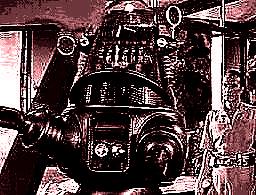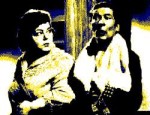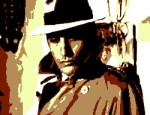Film Review
One of the most important films in the science-fiction genre,
Forbidden Planet still continues to
enthral audiences with its combination of groundbreaking special
effects, sophisticated storyline and sheer visual power. This was
the
Star Wars of its day, arguably
the finest sci-fi film of the 1950s and a film that would exert an
enormous influence over sci-fi, both in cinema and on television, for
over two decades. One of the first films to take science-fiction
seriously,
Forbidden Planet
set a high benchmark for subsequent films in the genre and it
still remains one of the best-loved, most highly regarded films of its
kind.
It was the phenomenal success of Universal's sci-fi films in the early
1950s that motivated MGM, a company renowned for blockbuster visual
extravaganzas (usually in the musical field), to make a genre-defining
spectacular which no other studio could match. The studio
succeeded, far beyond its wildest dreams. Most of the lavish
million dollar plus budget went on large-scale sets and extraordinarily
detailed props, which really did offer a convincing vision of an alien
civilisation on a far distant world. The pièce de
résistance was Robby the Robot, now one of the most recognisable
icons of the sci-fi genre and an obvious forerunner of cinema's other
mechanical marvels, notably the droids in
Star Wars. So popular
was Robby that he/it immediately reappeared in the film
The Invisible Boy (1957) and then
in countless American TV shows, including
The Thin Man,
The Twilight Zone,
Lost In Space,
The Man from U.N.C.L.E. and
Mork & Mindy. A marvel of
design, Robby is the star of this film (not that there is much
competition); the only member of the cast who is not out-classed and
out-staged by him/it is Walter Pidgeon, who makes a subtly menacing
villain, a far cry from the manic mad scientist of the early sci-fi
films.
The sophistication of the film's visual design is matched by that of
its screenplay which includes plot concepts which surpass almost
anything seen in sci-fi cinema up until this point.
Forbidden Planet is primarily an
ingenuous retelling of Shakespeare's
The
Tempest, with magician Prospero upgraded to über-scientist
Morbius, Miranda to Altaira, Ariel to Robby, and so forth.
Indeed, so faithful is the film to Shakespeare's original play that you
can't helping feeling the Bard merits an on-screen credit. The
same might also be said of Sigmund Freud, whose radical theory of the
human psyche (the division into the ego, super-ego and id) not only
underpins the plot but also gives us one of cinema's most original
sci-fi monsters.
The intelligently written screenplay brings a rare
level of realism and depth to the characters - rare that is
for a sci-fi film of this period. The performances
are not terrific but nonetheless we believe in the
characters and their predicament. The sequence in which the Id Monster makes its first
appearance (or semi-appearance) is the film's terrifying high point;
the revolutionary electronic score provided by Louis and Bebe Barron
helps to make this one of the most frightening sequences of any sci-fi
movie. No matter how many times you watch this part of the film,
it never fails to send a chill down the spine.
The influence of
Forbidden Planet
on the sci-fi genre cannot be exaggerated. Producer Gene
Roddenberry was inspired to create a television series based on this
film - that series became
Star Trek,
arguably the most successful series of the genre. Irwin Allen's
Lost In Space was also heavily
influenced by the film, borrowing the design of the spaceship, the
robot, and even the sets.
Star
Wars includes several obvious nods to the film (note the
similarity of the Krell City to the interior of the Death Star).
In fact, it is quite hard to find a sci-fi film that has not, in some
way, been influenced by it.
Forbidden
Planet is a masterpiece of its genre, a rare example of a
sci-film that is crafted with flair and intelligence, and with a budget
to make it work. Miraculously, the film has barely dated since
the day it first captivated cinema audiences and transported them - to
an amazing brave new world of the imagination.
© James Travers 2010
The above content is owned by frenchfilms.org and must not be copied.
Film Synopsis
In the year 2200, a United Planets expedition led by Commander Adams
arrives on Altair-4 to investigate the unexplained disappearance of an
Earth colony. Before he lands, Adams is contacted by Dr Morbius,
the last surviving colonist, and told to stay away. Adams ignores
the warning and begins his reconnaissance of the planet with his
officers Farman and Ostrow. Morbius explains that the other
colonists were all killed by a strange alien force which spared only
him and his wife. Since his wife died, from natural causes, his
only companions have been his daughter, Altaira, and Robby, a robot
that he built to undertake manual tasks and synthesise
food. For the past twenty years, Morbius has been absorbed
in his study of the Krell, the original inhabitants of Altair-4.
From the scientific and technological marvels they left behind, it is
apparent that the Krell had an immensely advanced civilisation, and yet
they died out overnight, many thousands of years ago. When
he sees Adams and his crew taking an unwelcome interest in his
daughter, Morbius becomes intolerant and warns them that they must
leave Altair-4 at once, otherwise they will be attacked and destroyed
by the same force that killed the colonists...
© James Travers
The above content is owned by frenchfilms.org and must not be copied.



